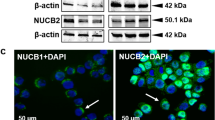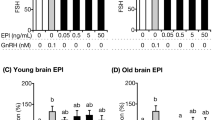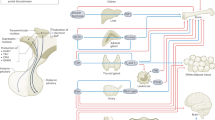Abstract
ON the basis of its activity as a thyrotropin-releasing factor, the tripeptide pyroGlu-His-Pro-NH2 (TRH) has been isolated from the hypothalamus1,2. Subsequently, the tripeptide was found in extrahypothalamic tissues of vertebrates and invertebrates and its activity as a prolactin-releasing factor and as a neurotropin has been recognised (for review see ref. 3). However, the way in which these different activities are elicited at different sites is still unknown. According to the concept of limited proteolysis4, distinct functions at different sites could emerge if TRH were susceptible to specific enzymatic attack. Degrading enzymes might therefore not only be responsible for the regulation of TRH concentration5–7, which in turn controls both the degree and the duration of the stimulatory effects of the tripeptide, but could also give rise to new activities. We report here the degradation of TRH by enzymes in serum, hypothalamus, pituitary and brain and the identification of the degradation products. We have also studied a presumptive metabolite, histidyl-proline-diketopiperazine, which seems to inhibit prolactin release.
This is a preview of subscription content, access via your institution
Access options
Subscribe to this journal
Receive 51 print issues and online access
$199.00 per year
only $3.90 per issue
Buy this article
- Purchase on Springer Link
- Instant access to full article PDF
Prices may be subject to local taxes which are calculated during checkout
Similar content being viewed by others
References
Burgus, R., Dunn, T. F., Desiderio, D. & Guillemin, R. C.r. hebd. Séanc. Acad. Sci., Paris, D. 289, 1870–1873 (1969).
Bøler, J., Enzmann, F., Folkers, K., Bowers, C. Y. & Schally, A. V. Biochem. biophys. Res. Commun. 37, 705–710 (1969).
Reichlin, S., Saperstein, R., Jackson, I. M. D., Boyd, A. E. & Patel, Y. Rev. Physiol. 38, 389–424 (1976).
Neurath, H. & Walsh, K. A. Proc. natn. Acad. Sci. U.S.A. 73, 3825–3832 (1976).
Bauer, K. Nature 259, 591–593 (1976).
Redding, T. W. & Schally, A. V. Proc. Soc. exp. Biol. Med. 131, 415–421 (1969).
White, N., Jeffcoate, S. L., Griffiths, E. C. & Hooper, K. C. J. Endocr. 71, 1–7 (1976).
Marks, N. in Peptides in Neurobiology (ed. Gainer, H.) 221–258 (Plenum, New York, London, 1977).
Rydon, N. H. & Smith, P. W. G. J. chem. Soc. 3642–3650 (1956).
Faivre-Baumann, A., Gourdji, D., Grouselle, D. & Tixier-Vidal, A. Biochem. biophys. Res. Commun. 67, 50–57 (1975).
Meites, J. & Clemens, J. A. Vitam. Horm. 30, 165–221 (1972).
Dhariwal, A. P. S., Grosvenor, C. E., Antunes-Rodrigues, J. & McCann, S. M. Endocrinology 82, 1236–1241 (1968).
Prasad, C., Matsui, T. & Peterkofsky, A. Nature 268, 142–144 (1977).
Author information
Authors and Affiliations
Rights and permissions
About this article
Cite this article
BAUER, K., KLEINKAUF, H., GRÄF, K. et al. Inhibition of prolactin secretion by histidyl-proline-diketopiperazine. Nature 274, 174–175 (1978). https://doi.org/10.1038/274174a0
Received:
Accepted:
Issue Date:
DOI: https://doi.org/10.1038/274174a0
This article is cited by
-
Serotonin (5-HT) stimulates thyrotropin-releasing hormone (TRH) gene transcription in rat embryonic cardiomyocytes
Endocrine (1997)
-
Drug-Induced Changes in Prolactin Secretion
Medical Toxicology (1988)
Comments
By submitting a comment you agree to abide by our Terms and Community Guidelines. If you find something abusive or that does not comply with our terms or guidelines please flag it as inappropriate.



